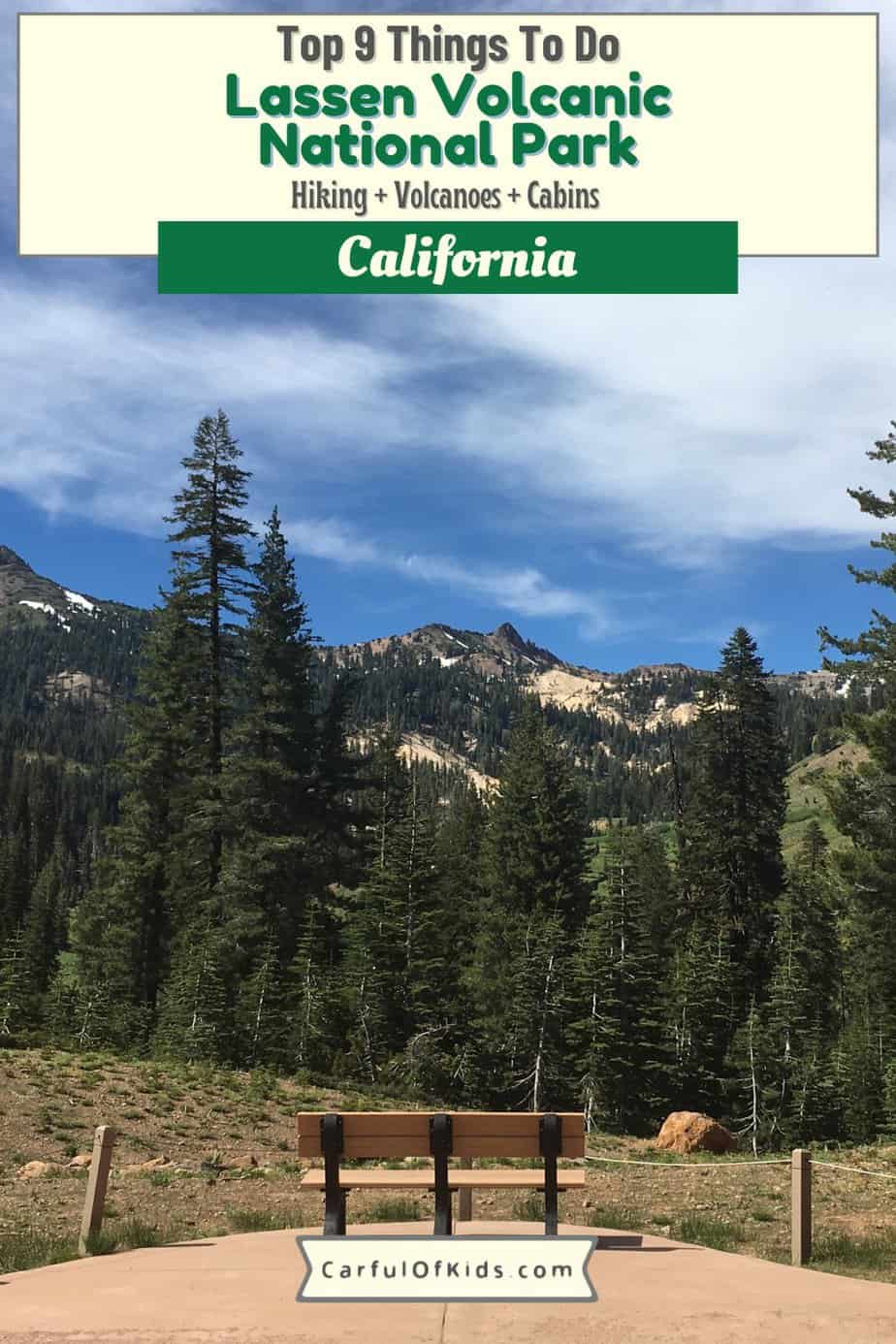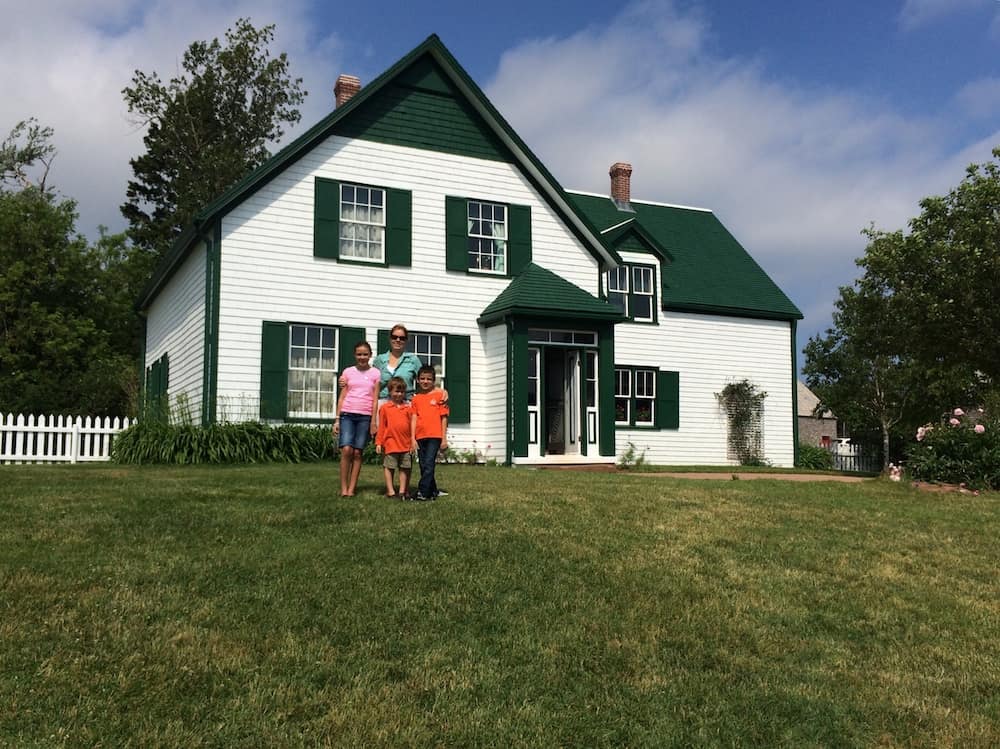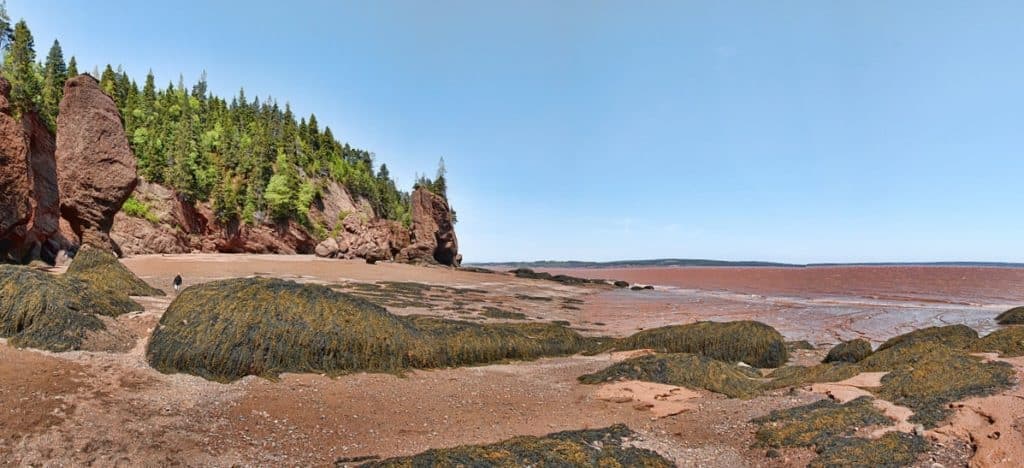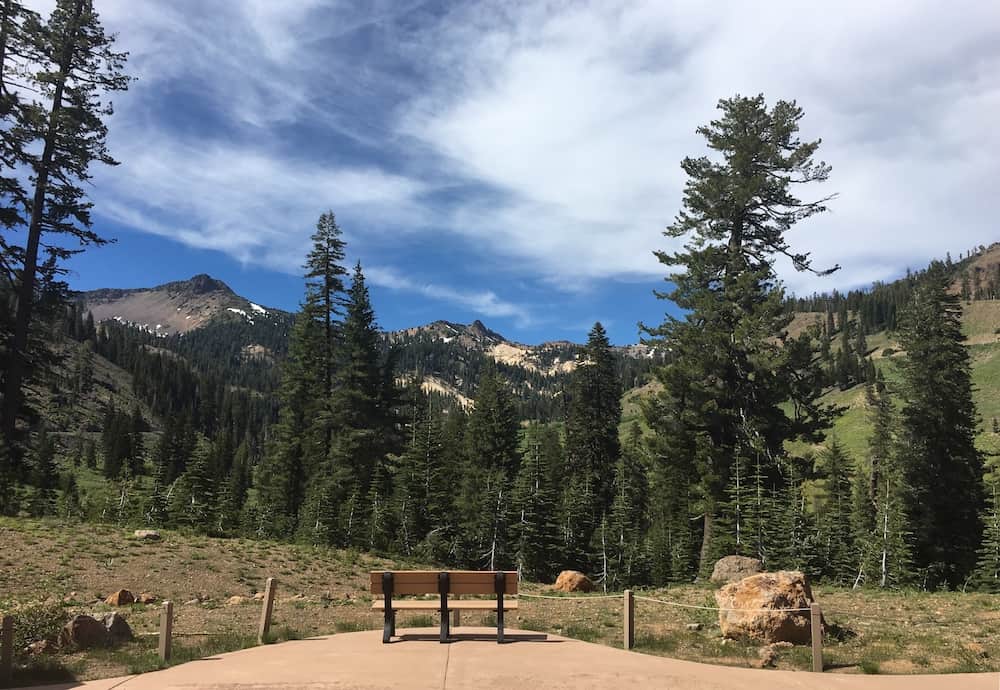
This gem in Northern California boasts fewer crowds than the national parks of Southern California. Like the more southerly Sequoia or Yosemite, Lassen Volcanic National Park is known for its majestic mountain scenery covered in evergreens. Lassen Park is actually a volcano since it is part of the Cascade Mountain Range. To learn more about its volcanic activity, start at the visitor center or hike to see the effects. Here are the top things to do at Lassen Volcanic National Park with kids.
Lassen National Park at a Glance
| Year Established: 1916 Though combined two national monuments from 1907 |
| Located: Northern California |
| Size: over 310,000 acres |
| Top Feature: Lassen Peak—the largest plug dome volcano in the world |
Top Things to Do in Lassen Volcanic National Park
Stop by a Visitor Center
Learn about Volcanoes
Drive through Lassen
Rent a boat
Take a Hike
Find a Summer Snow Play
Attend Night Sky Programs
Earn a Junior Ranger Badge
Camp
Why Visit Lassen Volcanic National Park
Lassen Volcanic National Park is one of those lesser-known jewels. Since it is located in Northern California, it is not as convenient as other California National Parks, like Yosemite and Sequoia.
During my trip, I was blown away by the scenery. From the snow-capped mountain peaks to the evergreen forests to the pristine alpine lakes, this area is stunning. Another factor that keeps visitors away is the snow. This park harbors its snowpack into the spring, keeping the main road closed.
However, for summer visitors, that keeps the temperatures cooler. Lassen Volcanic National Park offers outdoor activities, from canoeing to hiking to stargazing and camping. Just like most national parks, you must make your reservations in advance.
Top Things to Do in Lake Tahoe in Summer
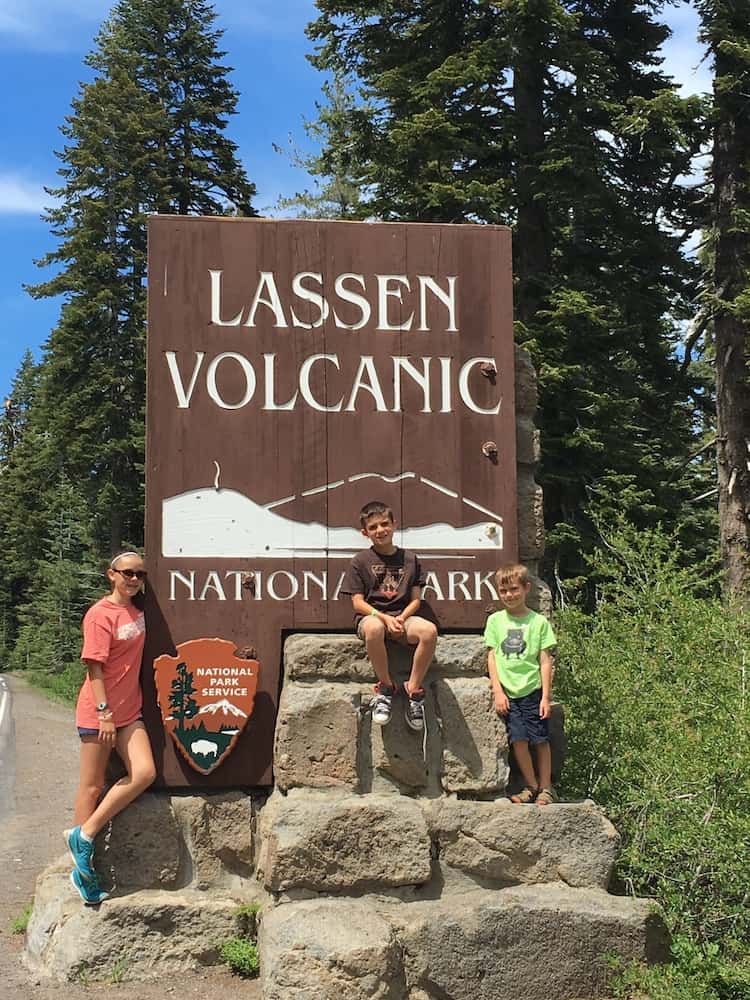
Visitor Centers in Lassen
There are two visitor centers in the park. At each, you can find maps, junior ranger booklets, restrooms, and interpretive areas. You can also learn about seasonal park ranger programming.
Kohm Yah-Mah-Nee Visitor Center
At the southwest entrance of the park, it’s the place to learn about the volcanic activity in the park. If your child wants to earn a Junior Ranger badge, find the answers in the interpretive display. Finally, there’s a short educational film too.
You can find a cafe with salads, sandwiches, coffee drinks, soft drinks and ice cream, along with a gift store. Wi-Fi is available, too.
Open daily from May 1 to October 31, 9 a.m. to 5 p.m. From November 1 to April 30, it is open Wednesday to Sunday from 9:30 a.m. to 4:30 p.m.
Loomis Museum
Located at the northwest entrance near Manzanita Lake, the Loomis Museum displays the original equipment used to document the last eruption. Find traditionally made baskets as well.
Open during the summer from 9 a.m. to 5 p.m.
Guide to Redwood State and National Park in Northern California
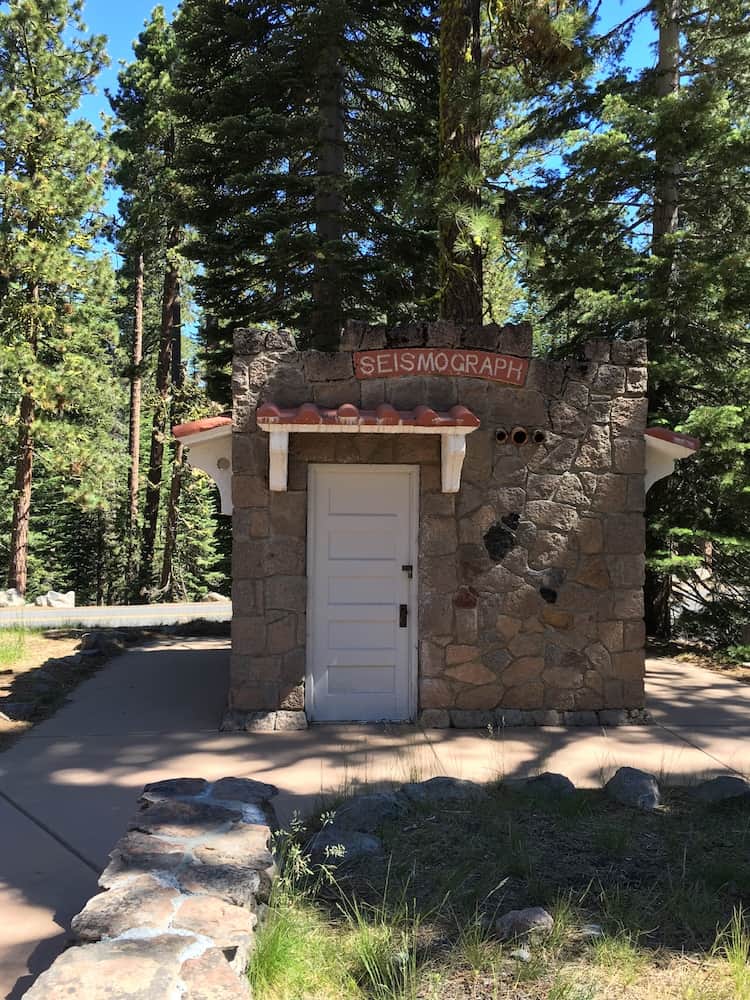
Learn about Volcanoes
The big draw in Lassen Volcanic National Park is the volcanoes. Its namesake, Lassen Peak, is the largest plug volcano in the world.
Take some time to learn more about the super forces of nature. My kids snooze during science class, though if you mention seismic activity, they’re all ears.
In Lassen Volcanic National Park, you can find all four types of volcanoes. Then, look for volcanic features throughout the park, such as mud pots and fumaroles, steam vents and sulfur springs.
- Cinder Cone—Cinder Cone, near Butte Lake
- Shield—Mount Harness, near Juniper Lake
- Plugged Dome—Lassen Peak
- Composite—Brokeoff Mountain, near the southern entrance
Visit one of the hydrothermal areas while in Lassen. Learn about the different types of volcanic rocks in the Devastated Area.
• Bumpass Hell–16-acre site with mud pots, pools and steam vents, including the Big Boiler. Find a boardwalk to hike the 3-mile round-trip trail. Note this trail might be closed due to snow.
• Sulphur Works–Easy area to explore, one mile from the Southwest entrance.
• Cold Boiling Lake–Close to the Kings Creek Picnic Area see a bubbling lake.
During your visit, kids can earn the Lassen Volcanic National Park’s Volcano Club patch (an additional $2.50 fee). Pick up a booklet at the visitor center or Loomis Museum. Then, complete seven of the 14 activities listed.
Top Western Mountain Destinations for Families
Scenic Drives in Lassen
Lassen Volcanic National Highway—The 30-mile (48 km) scenic route is the only road that bisects the park and open seasonally. It’s a must for a summer visit and connects Manzanita Lake with the Southwest entrance.
Juniper Lake Road—A 13-mile (20 km) road outside of Chester, CA, on the southeast part of the park used to reach the lake. Seasonal road with steep inclines and gravel for the last portion.
Warner Valley Road—A 13-mile (20 km) road outside of Chester in the southern part of the park used to reach Drakesbad Ranch and Warner Valley campground. Seasonal road with steep inclines and gravel for the last portion.
Butte Lake Road—A 6-mile (9 km) road on the northeast portion of the park. A seasonal gravel road opens in the summer. Consider checking in with a park ranger as to the condition of the road.
National Parks with Volcanoes
Hiking in Lassen
With over 150 miles of trails in Lassen Volcanic National Park, take the family hiking during your visit. The Pacific Coast Trail (PCH) long-distance trail runs through Lassen for 17 miles and marks the halfway point.
| Trail Name | Distance | Elevation |
| Devastated Area Interpretive Trail | .5-mile | 6,470 feet |
| Lily Pond Nature Trail | .75-mile | 5,920 feet |
| Manzanita Lake Loop | 1.5-mile | 5,890 feet |
| Boiling Springs Lake | 1.8-mile | 5,640 to 6,020 feet |
| Crystal Lake | .8-mile | 6,820 to 7,200 feet |
| Cold Boiling Lake | 1.4-mile | 7,380 to 7,420 feet |
Oregon Caves National Monument in Southern Oregon
Water Sports in Lassen
There is water recreation in Lassen Volcanic National Park, like swimming, boating and fishing. Though the water is cool, even in the summer.
• Swimming–Manzanita Lake, Summit Lake and Emerald Lake
• Non-Motorized Boating–Butte Lake, Juniper Lake, Summit Lake. Manzanita Lake offers kayak, canoe and SUP rental.
• Catch-and-Release Fishing–Manzanita Lake, Butte Lake and Horseshoe Lake offer trout. Requires a valid California Fishing License (16+).
Winter in Lassen
Snow comes early to Lassen Volcanic National Park, and the scenic drives close from December until May. When the scenic roads are closed, cross-country skiing and snowshoeing are other ways to get around.
The Manzanita Lake area is plowed regularly and offers winter recreation like sledding, cross-country skiing and snowshoeing. Near the Loomis Museum, you can find a parking area with a year-round restroom.
In the southwest area of Lassen Volcanic National Park, near the Kohm Yah-Mah-Nee Visitor Center, there is another snow play area. This area offers steeper terrain for sledding. Picnicking is allowed in the parking lot.
Guide to Hawaii Volcanoes National Park
Wildlife Viewing in Lassen
Lassen features three different ecological zones. So many animals live within the park though dawn and dusk are the best wildlife viewing times. The Park Rangers can also point out areas with the best chance to see wildlife.
- Black bear (though not Grizzly bear)
- Mule deer
- Red fox
- Gray fox
- Mountain lion
- Bobcat
- Mink
- Beaver
- Pika
- Snowshoe Hare (white)
- Bats
Be Bear Aware
Lassen Volcanic National Park is home to about 30 bears. The National Park Service recommends the following guidelines to reduce encounters.
•Make noise when hiking; kids are good at this.
•Be aware of the possibility of bears at streams.
•Store food when not eating or preparing in the bear-proof storage lockers.
•Keep 100 years between you and bears.
•Put all trash in a bear-resistant trash container.
Summer Guide to Lake Tahoe
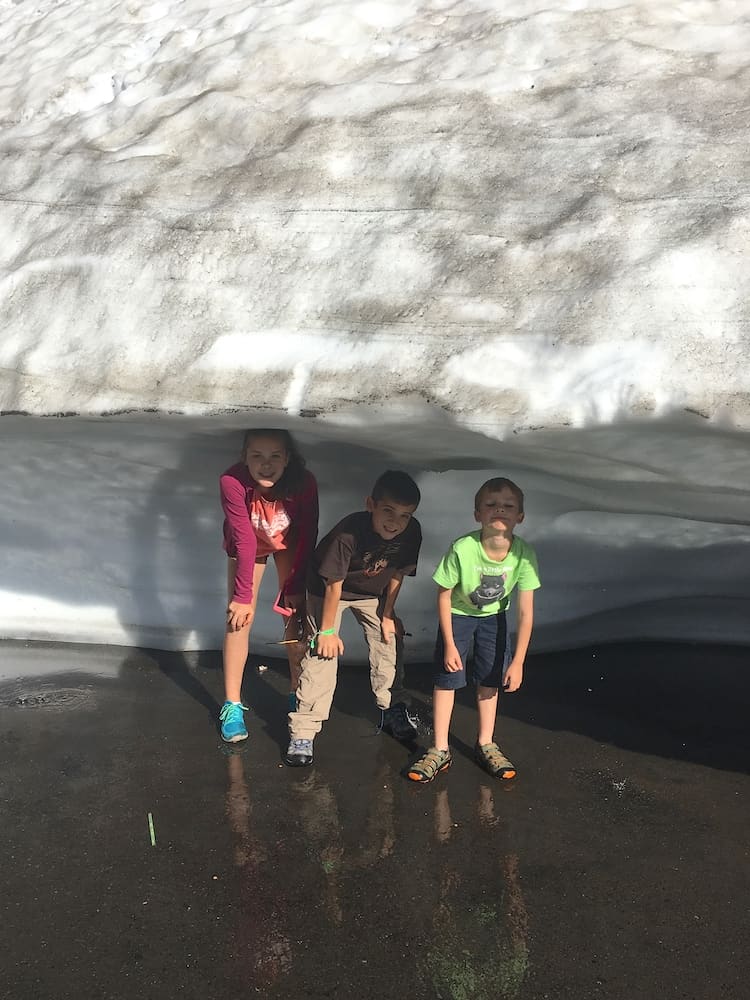
Kids at Lassen Volcanic National Park
The Junior Ranger Program is the go-to program for families to learn more about Redwood National Park. It’s free and takes about two hours to complete. My kids love the badges that the park rangers present them with after they complete their booklets.
Since a ranger station is located at both entrances, pick up the Junior Ranger booklets at either entrance. While exploring the park, complete the activities based on age. Lassen Volcanic National Park hands out patches instead of plastic or wood badges.
Additional Junior Ranger Badges
Lassen Volcanic National Park offers additional Junior Ranger badges.
Junior Ranger Night Explorer–Earn a Night Sky Badge or work on it during your stay.
Junior Firefighter Program–An opportunity to learn about the important work of the U.S. Forest Service and the NPS.
Lassen Volcanic National Park Volcano Club–Pick up a Volcano Card at the Visitor Center and complete the required activities.
Guide to Junior Ranger Badges
Where to Eat in Lassen
Lassen Volcanic National Park doesn’t feature a lodge with dining, so visitors need to be prepared to pack their own food.
Manzanita Lake Camper Store
If you need something basic, stop by the camp store. It sells salads, sandwiches, s’mores kits, soft-serve ice cream, beverages, and apparel. You can also rent kayaks for Manzanita Lake.
The only gas pump in the park is behind the store and is seasonal. Find showers and a coin-operated laundry next to the camper store, too.
Open seasonally from May until early October.
Kohm Yah-Mah-Nee Visitor Center
Find a small cafe inside the visitor center with salads, sandwiches, coffee drinks, soft drinks and ice cream as well as a gift store. Wifi is available, too.
Picnicking in Lassen
Find picnic tables at several popular sites within the park.
- Lake Helen
- Kings Creek
- Summit Lake North
- Manzanita Lake
What to do at Mount St. Helens National Volcanic Monument
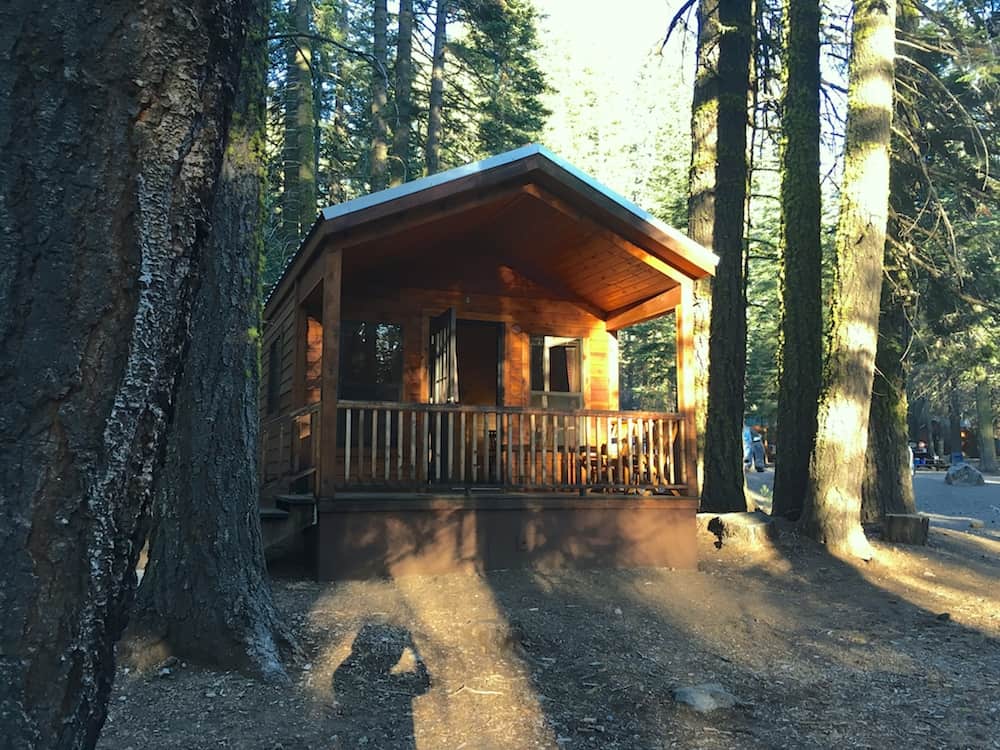
Where to Stay in Lassen Volcanic National Park
If the kids are begging to camp, Lassen Volcanic National Park offers some options. From traditional tent camping to RV camping, camping cabins, and glamping, Lassen offers it all.
Manzanita Lake Camping Cabins
During our visit, I reserved a camping cabin. It’s a family favorite; all the camping kids love with the roof, door and electricity Mom needs. There are even bunk beds for the kids.
Bring the gear for a cookout, like a stove and a lantern. Then, add the sleeping bags to throw on the mattresses. And don’t forget the marshmallows.
Each cabin features two rooms: one outfitted with a futon, a small table and two chairs, and the other with two sets of bunk beds with mattresses. The cabin also features a front porch.
Outside, enjoy dinner under the stars with a standard picnic table, a fire ring with a grate and a bear box for food storage. A water spigot is nearby, and the bathhouse and the Manzanita Camping Store are within walking distance.
Drakesbad Guest Ranch–Closed for 2024 due to Dixie Fire
For an exclusive experience, stay at the Drakesbad Guest Ranch for a rustic lodge decorated in pine furnishings. Enjoy a mineral water pool, fly-fishing in Warner Valley, horseback riding or pony rides along with campfire s’mores, archery and arts and crafts for the kids. $$$$
Located in the Warner Valley area. Open from early June until early October, and reservations are a must.
What to do at Mount St. Helens National Volcanic Monument
Campgrounds in Lassen Volcanic National Park
In Lassen, traditional campsites offer a picnic table, fire ring, bear box, potable water nearby and toilets (vault or flushing).
The campgrounds are open from early June until the snow closure in the fall (October). There are no hookups in the park, though there is a dump station at Manzanita Lake.
Manzanita Lake
- Summer only
- Reservations required
- 179 sites, including RV sites
- Potable water with flush toilets
- Dump station
- Camper Store with Showers and Laundromat
Butte Lake Campground
- Summer only
- Reservations required
- 101 sites, including RV sites
- Potable water with flush toilets
Summit Lake North Campground
- Summer only
- Reservations required
- 46 sites, including RV sites
- Potable water with flush toilets
Summit Lake South Campground
- Summer only
- Reservations required
- 48 sites, including RV sites
- Potable water with flush toilets
Juniper Lake Campground–Closed for 2024 due to Dixie Fire
- Summer only
- Reservations recommended
- 18 sites, no RVs
- Lake water only
Warner Valley Campground–Closed for 2024 due to Dixie Fire
- Summer only
- Reservations recommended
- 17 sites, no RVs
- no water
You can also find the Lost Creek Group Campground and the Southwest Walk-in, which has 20 sites (it will be Closed in 2023 due to the Dixie Fire).
Oregon’s Newberry National Volcanic Monument Guide
History of Lassen
Lassen Peak started to erupt 825,000 years ago. Four different American Indian groups used Lassen during the summer months.
Then, the Gold Rush brought settlers looking for gold. Then, the Emigrant Trail passed through Lassen, with more settlers looking for a new life on the West Coast.
It’s been over a hundred years since the last eruptions of Lassen Peak, from 1914 to 1921. At the time, local Benjamin Loomis documented the eruption. He later advocated for the creation of a national park.
In 1907, Theodore Roosevelt created two separate national monuments in the area. In 1916, they were combined to form Lassen Volcanic National Park, the fifteenth national park in the National Park Service.
The People of Lassen
Four American Indian groups lived in the Lassen area. The Atsugewi, Yana, Yani and Maidu people moved to the area during the warmer months for hunting and gathering. At the Loomis Museum, visitors will find artifacts, like pine needles woven into baskets.
Next, William Nobles and Peter Lassen developed a pioneer trail through the Lassen area. Emigrants used the trail during the Gold Rush to reach California.
Benjamin Loomis photographed the 1914-1915 eruption. To see his work, stop by the Loomis Museum.
Where’s Lassen Volcanic National Park
Located north of San Francisco, Lassen Volcanic National Park is 50 miles east of Redding. Redding is the largest city located north of Sacramento so it offers all the services and supplies for travelers.
Lassen Volcanic National Park is open 365 days a year and 24 hours a day. Use an America the Beautiful annual pass ($80) or purchase a 7-day pass for $30 per vehicle.
The main road through Lassen National Park closes for snow. Lassen Volcanic National Park Highway usually fully opens up in late May or early June and closes in late October or early November.
Note: Some areas of the park are closed due to the effects of the 2021 DIxie Fire.
Guide to National Park Passes
Altitude Sickness
When traveling over 8,000 feet, look for acute mountain sickness. It’s caused by a lower amount of oxygen at higher elevations. Look for the following symptoms:
- Headache
- Fatigue
- Dizziness
- Nausea
- Rapid heartbeat
- Shortness of breath
- Insomnia, or restless sleep
If anyone in your group is exhibiting any symptoms, then head down 2,000 feet and definitely below 10,000 feet.
To prevent symptoms, head up into the mountains at a gradual pace, especially if you live at sea level. Spend a day at 5,000 to 7,000 feet, take it easy and drink lots of non-alcoholic fluids.
I have a child who suffers from Altitude Sickness, and I didn’t know it was an issue until a trip up Pike’s Peak in Colorado (14,000 feet).
First, he got a severe headache and started crying. Since it was a short trip, the cog train left after 45 minutes at the top. Thankfully, he fell asleep on the way back down and felt better at a lower elevation.
Then, we cut short a ski trip on a 10,000-foot mountain. Now we realize he can’t go over 9,000 feet, and it hasn’t been an issue since. However,h I remind him to drink lots of fluids and keep track with a graduated water bottle.
Know Before You Go
- Stay on boardwalks and established trails in thermal areas.
- Cell service is limited. And data is non-existent.
- Watch your children at all times. Many features have barricades kids can climb over.
- Wild animals are unpredictable; give them space and don’t feed them.
- Bring food and refillable water bottles for your visit. Food service is limited.
- Know your personal limits and the limits of your equipment.
